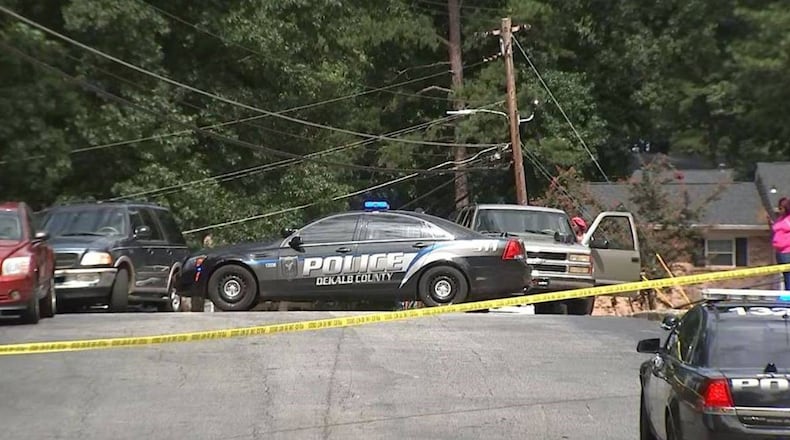A former owner of a DeKalb County apartment complex and its lawyers face extraordinary sanctions after a federal judge found that they tried to mislead the court and hide evidence in a civil suit over a mother of three killed by a stray bullet while in bed.
In a scathing 368-page ruling, U.S. District Court Senior Judge Charles A. Pannell, Jr. wrote that Contour Development Group, which previously operated Eastwyck Village Apartments, and its defense team enabled the destruction of a trove of emails. They also failed to disclose dozens of witnesses, including 42 of the company’s own employees.
The acts were part of the defense’s “intentional, bad-faith strategy” to drag out proceedings and keep lawyers for the children of shooting victim Tijuana Frazier from uncovering evidence that could prove their case, Pannell ruled.
“This is a situation about dishonesty, assisting in dishonesty, and attempting to mislead the court about dishonest activity,” the ruling says.
These misdeeds, it says, amount to “fraud on the court.”
Frazier was sleeping on April 6, 2019, when a bullet fired from outside the apartment pierced an exterior wall and hit her, court records state. A friend discovered her body hours later. At the time, Bloomfield Hills, Mich.-based Contour owned Eastwyck Village Apartments through a related company.
The decision, handed down in Atlanta federal court on Dec. 15,means that Contour is liable in Frazier’s death. This grants her survivors a win and clears the way for a jury to decide how much money to award them.
The decision also orders Contour and its defense lawyers Chris J. Perniciaro and Matthew G. Moffett to pay attorney’s fees to the survivors’ lawyers for the extra time they spent on the case as a result of “the defendant’s misdeeds,” it says.
Moffet, a named partner in the Atlanta-based firm Gray, Rust, St. Amand, Moffett & Brieske, declined comment on the case. Perniciaro is also a partner at the firm.
Attorney Michael Rafi, who is suing on behalf of Frazier’s survivors, said he has repeatedly seen operators of apartment complexes and others seeking to dodge responsibility use the kinds of tactics described in the ruling.
“What you read in that order is not uncommon,” Rafi said. “What’s uncommon about it is we were able to prove it.”
Judges rarely hand out such severe sanctions, but such penalties are long overdue, said Stephen Apolinsky, who represents victims in personal injury cases. Too often, defense attorneys take liberties knowing that they will not face punishment.
“The recent ruling is highly unusual but was warranted based on the facts laid out,” said Apolinsky, who is not involved in the Eastwyck case.
Contour purchased the complex near Candler Road and I-20 in Oct. 2017 for $23.65 million and sold it about three years later for $36 million, a more than 50% gain. Its new owners renamed it Villas at Decatur.
Eastwyck resembles hundreds of area apartment complexes identified in Dangerous Dwellings, a year-long Atlanta Journal-Constitution investigation, as having extraordinary levels of violence and poor living conditions. Tens of thousands of residents in Clayton, Cobb, DeKalb, Fulton and Gwinnett counties live in these complexes. The Journal-Constitution analyzed records from local police, courts and code enforcement offices as well as state and federal sources to create a methodology that identified 272 persistently dangerous apartment complexes. The AJC published the list earlier this month.
Combined, these complexes account for at least 281 homicides and 20,000 serious crimes over the past five years, the Journal-Constitution examination shows.
Georgia’s lack of tenant protections and basic condition standards allow these complexes to flourish, enabling a class of predatory owners who are eager to profit off of metro Atlanta’s affordable housing crisis. Out-of-town owners are flocking to the area, buying dilapidated apartments, raising rents, flipping them for millions in gains, and leaving residents to live amidst mold, sewage backups, gunfire, chronic apartment fires or other hazards.
Identifying dangerous complexes can be challenging for the public as well as local officials. Often, police reports omit the name of a apartment complex where a crime took place, specifying only its address, while property records fail to list what could be dozens of street addresses within a complex. Because of that, the AJC has reported the number of dangerous apartment complexes in the metro area likely exceeds the 272 the newspaper identified on its list.
Eastwyck was one of those unidentified complexes. The Journal-Constitution did not initially place the south DeKalb complex on the list of persistently dangerous apartments but has added it in light of information in the Dec. 15 court filing.
The AJC’s analysis of police records shows more than two dozen serious crimes in recent years at Eastwyck, including the July 2017 shooting death of a man in his apartment, a July 2020 shooting that wounded a teen and an 8-year-old, and an October 2019 shootout where a 4-year-old was hit by a stray bullet.
But this number reflects only a fraction of the complex’s violence. Frazier’s death was reported by DeKalb police at 384 Eastwyck Circle, an address that public records do not clearly identify as part of the apartment complex. Police listed 29 additional crimes on that street in the past five years. Those included five aggravated assaults and seven robberies. There were another 62 crimes reported at addresses on Eastwyck Road, which includes parts of the complex. Those crimes included 14 aggravated assaults and eight robberies.
The Dec. 15 order describes a years-long effort by Contour and its attorneys to avoid giving over evidence that the owners of Eastwyck Village Apartments knew it was overrun with crime.
The defendant’s strategy, the order says, was “to know as little as possible about its/their client’s documents and the underlying facts, enabling delay, denial, non-disclosure and outright document destruction at every turn.”
One Contour employee whose identity was not initially disclosed said in a sworn affidavit that in two months at the complex, he heard 10 shootings, the order states. Employees kept the leasing office door locked because they feared for their safety and would drop to the floor whenever gunshots rang out.
In one 2018 email, an Eastwyck employee warned a Contour executive that a security worker planned to leave if he did not receive a raise to $15 an hour, in addition to 30% off rent. The officer constantly had to break up fights and deal with “residents and guest with guns, filming music videos.”
“Please help me,” the employee wrote.
At one point during proceedings, Contour attorney Perniciaro said he failed to disclose an eyewitness to the crime because he “forgot about him,” the order states, then later said he made a “judgement call” to withhold the information. Contour also repeatedly failed to identify Eastwyck’s manager at the time of Frazier’s killing.
The defense hid so much evidence that “the truth is utterly unknowable at this juncture,” the court concluded.
In light of information in the federal court ruling, The Atlanta Journal-Constitution added Eastwyck Village Apartments, now known as Villas at Decatur, to its list of persistently dangerous apartment complexes. The list was developed as part of Dangerous Dwellings, a year-long investigation into the extreme violence and poor living conditions in apartments that at least tens of thousands of metro Atlantans call home.
About the Author
Keep Reading
The Latest
Featured

